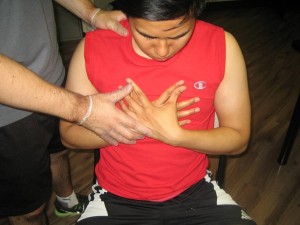Acute myocardial infarction is the medical term for heart attack. This is a dangerous condition that arises once the flow of blood to the heart is suddenly disrupted, resulting to tissue damage.
This is likely to occur from blockage in one or several coronary arteries. The blockage can develop due to the accumulation of plaque.
What are the signs?
Although the characteristic signs of acute myocardial infarction include chest pain and shortness of breath, the symptoms tend to vary.
The usual signs include the following:
- Tightness or pressure in the chest
Discomfort in the chest, jaw, back and other sites in the upper body that lasts more than a few minutes or subsides and returns. - Sweating
- Discomfort in the chest, jaw, back and other sites in the upper body that lasts more than a few minutes or subsides and returns
- Nausea and/or vomiting
- Sweating
- Anxiety
- Cough
- Rapid heart rate
- Dizziness
Management of acute myocardial infarction
An acute myocardial infarction requires prompt treatment. Angioplasty is a minimally invasive procedure that might be carried out to clear the arteries providing blood to the heart.
During the process, a thin, long tube or catheter is inserted via the artery to reach the obstruction. A miniature balloon attached to the catheter is expanded to open up the artery and restore the blood flow again. A stent is placed at the site of the obstruction to prevent the artery from closing again.
Coronary artery bypass graft is performed in some cases. During the procedure, the surgeon will reroute the arteries and veins to allow blood to flow around the obstruction.
Various drugs are also utilized to manage a heart attack:
- Blood thinners such as aspirin to breakdown blood clots and improve the flow of blood via constricted arteries.
- Antiplatelet drugs such as clopidogrel work by preventing the formation of new clots and growth of any existing clots.
- Thrombolytics work by dissolving clots
- Nitroglycerin are given to widen the blood vessels
- Beta-blockers work by lowering the blood pressure and allowing the heart muscle to relax. This helps limit the seriousness of damage to the heart.
- Pain medications are given to lessen the discomfort
- ACE inhibitors are used to reduce the blood pressure level and lower the strain on the heart
Disclaimer / More Information
The information posted on this page on myocardial infarction is for learning and educational purposes only. To learn to recognize the signs, register for first aid training at one of our training centers located throughout Canada. The training centers are in Edmonton, Calgary, Vancouver, Kelowna, Saskatoon, Victoria, Surrey, Mississauga, Winnipeg, Red Deer, Toronto, Ottawa and Halifax.

